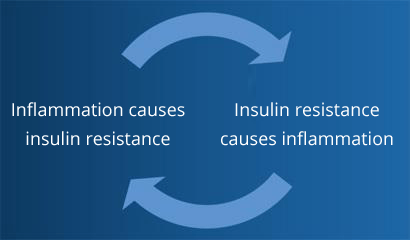What is “inflammatory status”?
The inflammation process is a natural defence system which enables the body to survive in a hostile situation.
Our gut, skin, respiratory system and state of mind are all continually under attack. To maintain the equilibrium so vital and precious to our body, a complex defence system is mobilised. Immune system cells, enzymes and cytokines are all deployed to destroy the invaders and repair the body’s cells.
Cytokines (from the Greek words cyto (= cell) and kinos (= movement)) are proteins synthesised by immune system cells. Their role is to regulate the activity of other cells (stimulation, inhibition). Just like hormones and neuromodulators, these compounds are essential for cell communication and functioning.
The long-term assault scenario
When the attack on the body is chronic and insidious, the inflammatory defence processes are activated, even though, we may not necessarily be aware of it.
“Low-level inflammation” refers to the inflammatory reactions which accompany gradual weight gain. These extra kilos impair the correct functioning of body systems. This inflammation lays the foundation for all chronic disease.
The short, sharp attack scenario
When the body responds to a sudden attack, the inflammation is acute and expressed by four characteristic signs which are PAIN, REDNESS, HEAT (local and/or systemic inducing a high temperature) and OEDEMA.
How does inflammation lay the foundations for obesity?
Several mechanisms are involved. The one most directly involved relates to the fact that the inflammatory status modifies the biochemical structure of insulin. The result is that insulin is no longer able to regulate correctly the sugar level in the blood (glycaemia).
The glycaemia then remains at a high level, which further stimulates the secretion by the pancreas of insulin which is still unable to correctly store sugar in the blood. At the same time, and as a consequence of the increase in body fat, resistance to insulin gradually develops. This insulin resistance in turn promotes inflammation. The vicious circle is thus established.
Insulin is a hormone secreted by the pancreas. Its role is to maintain normal blood sugar levels by promoting the absorption of sugar from the blood into various cells :
- liver cells (sugar reserves stored as glycogen)
- muscle cells (transformation into energy, if the individual performs physical exercise)
- fatty tissue cells (in the form of triglycerides): resulting in weight gain

How does obesity maintain inflammation?
In addition to the insulin resistance which is the core component of the problem, several elements contribute to establishing inflammation in an overweight individual.
Diet
The diet of an obese person contains too many foods which inflame their body :
- the wrong types of oil: too many saturated fats, too much cooked fat, too much omega-6 (pizzas, pastries, processed foods, etc.)
- too much sugar which triggers the secretion of insulin, a storage hormone, which promotes inflammation: sugary desserts, cakes, white bread, alcohol, etc.
The microbiota
The intestinal microbiota of an overweight person is in a state known as “dysbiosis”, which means that it is out of balance. This bacterial population which lives inside the gut (forming part of its “contents”) plays an important role in the correct functioning of the intestinal barrier (the “container”).
However, when this intestinal barrier is impaired, it allows substances to cross the barrier which should normally pass through the gastrointestinal tract and be eliminated. This “intestinal hyperpermeability” phenomenon triggers inflammation which is initially local before extending to become systemic.
Adipocytes (fat cells)
Adipocytes (cells that make up the fatty “adipose” tissue) secrete pro-inflammatory cytokines which sustain the inflammation.
Micronutritional advice to combat inflammation
Combating inflammation is one of the key purposes of a healthy diet and one of the best ways to lose weight.
What are the “super foods” which will help you?
- omega-3 fatty acids found in rapeseed, walnut and camelina oil and in oily fish (especially herring, sardine, mackerel, etc.)
- vegetables, with cruciferous vegetables such as broccoli, at the top of the list
- green tea (a powerful antioxidant)
- turmeric for its anti-inflammatory properties
- vitamin D, which is also anti-inflammatory, found in cod liver oil, smoked herring, sardine, egg yolk, etc.

What signs should prompt a consultation with a healthcare professional?
Low-level inflammation, by definition, does not have any particularly noticeable symptoms. Some non-specific signs may appear which should prompt you to arrange a consultation if they continue for a while, such as :
- miscellaneous digestive disorders: alternating periods of diarrhoea and constipation, sticky stools, abdominal pain after consuming certain foods, bloating, foul-smelling flatulence, etc.
- long-term weight gain, notably with a predominance of abdominal adipose fat (waist measurement of more than 102 cm for men and 88 cm for women)
- persistent fatigue, difficulties recovering after winter-season viral infections, etc.
- chronic disease of all types
Your healthcare professional can then investigate fully and confirm any inflammation with blood tests, etc. They will know how to support you in combating this condition that has such adverse impacts on your health.


